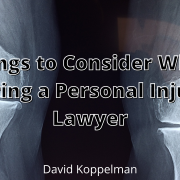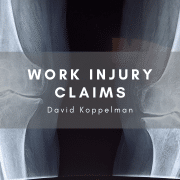The Difference Between Personal Injury and Workers Comp
Sometimes in the workplace, injuries can occur, whether they are technically your fault or not. When this happens, you may want to file a worker’s compensation claim to help pay certain medical bills and damage recovery. However, this is not your only option. You can also file a personal injury claim, which might even provide you with better compensation than the worker’s comp. Let’s discuss the difference between personal injury claims and workers compensation claims, as featured in an article by Dolman Law.
What makes workers’ compensation different from a personal injury claim is proving fault. Workers’ comp does not rely on fault, and even if an injury you sustained in the workplace was somehow your doing, you are still entitled to compensation. Workers’ compensation protects workers because even if the injury were the employee’s fault, they would not have sustained that injury if they were on-site or doing that work. Workers’ compensation gets you money for economic costs like pain and suffering. Additionally, you might receive recovery for damages such as vocational rehabilitation, medical expenses, and permanent impairment benefits. However, when you choose to file workers comp, you will not receive anything outside of financial assistance.
A personal injury claim is different because it can be filed by anyone, not just workers who were hurt on the job. If you have experienced an injury due to the negligence of someone or something else, you are entitled to file a personal injury claim. Also, in order for someone to recover damages from a personal injury claim, they must be able to prove that the fault of the injury was with the other party involved. Contrasting workers comp, personal injury damages are compensatory. These include lost wages, damages for pain and suffering, medical expenses, and future earning capacity loss. These are non-economic aspects of recovery that workers comp does not provide for.
There are various instances in which you can file a personal injury claim along with a workers’ comp claim. Some examples include if the injury was caused by using a defective product at work, if the injury involves an illegal or toxic substance, and if an employees’ actions against you were intentionally meant to cause serious harm or death. Make sure that when filing either of these claims, you hire an experienced lawyer to navigate you through the complex process.












